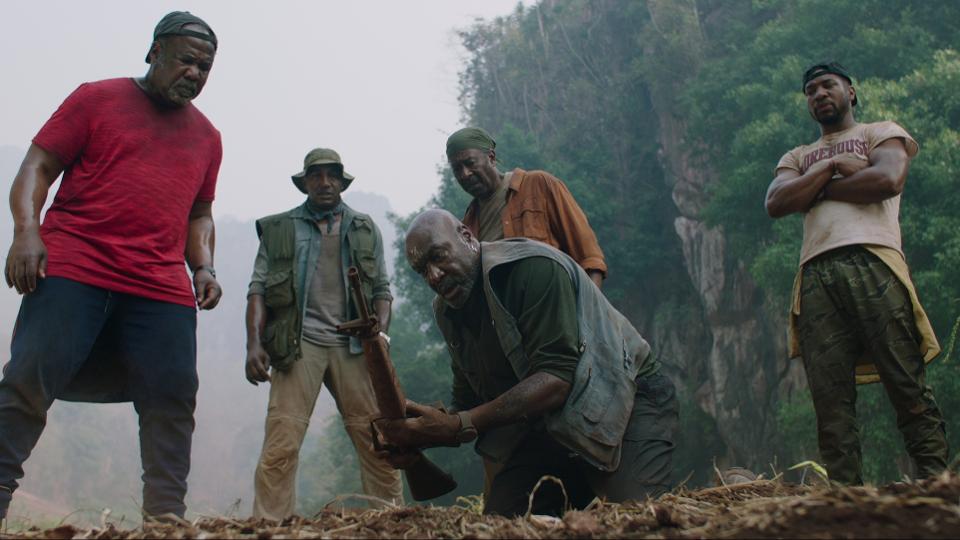When Spike Lee’s Do the Right Thing came out in 1989, there was much discussion around what “the right thing” actually was. At the film’s climax, a police officer murders a young black man with a chokehold, prompting Mookie—the film’s protagonist, played by Spike Lee himself—to throw a trash can through the window of a pizzeria and start a riot. Questions about “the right thing” mostly centered around this act: was it right to destroy property as a response to racial injustice? Hinting at an answer (of sorts), Lee ends the film with a Martin Luther King Jr. quote decrying violence in response to oppression—but then, he follows it up with a Malcom X quote encouraging violence in response to oppression. Which is “the right thing”? Neither. That’s the point: it’s not that simple. It’s never that simple. If you’re dissatisfied with that, you’re not going to like Da 5 Bloods.
Lee’s newest film, premiering on Netflix due to the ongoing pandemic, follows four black Vietnam veterans who return to ‘Nam in search of two treasures: the remains of their fallen friend and literal buried gold. Each of da bloods is at a critical juncture in their life—one’s broke, another’s addicted to pain pills, all of them have crippling PTSD—but the most tortured of them is Paul, a jingoistic, Trump-supporting hothead who’s still haunted by nightmares of his fallen comrade. After the four vets meet in Ho Chi Minh, they’re intercepted by Paul’s son David, who joins them out of concern for his father.
The first act of Da 5 Bloods is a slow, winding trip back to the old battleground, traveling at the speed of Apocalypse Now’s river boat—and with plenty of winking references to Coppola’s Vietnam venture. This portion of the movie is Lee’s first work in years to feel reminiscent of his earliest films. Like in Do the Right Thing, a lot of the social commentary is bubbling under the surface, raising questions that aren’t supposed to have clear answers. Lee and co-screenwriter Kevin Willmott achieve this complexity by getting across how mercilessly connected everything is: racial tension, greed, imperialism, war—none can be “solved” unless all of the above are interrogated, and anything less will end in disaster. Lee ensures that this comes across in character interactions, keeping the human toll at the forefront. Take Paul, for example: we learn that he’s a Trump supporter because he fears immigrants, that his fear of immigrants stems partly from his hate of the Vietnamese, that he hates the Vietnamese because of his time in the war. Why did he enlist? Some Black Americans at the time believed that joining the country’s wars would help lessen racial tension. Why was there a Vietnam War? Imperialism. Greed. It’s all so entangled—and when that’s in the back of your mind, an altercation between Paul and a pushy Vietnamese merchant speaks more than volumes.
Later in the movie, when the treasure hunt starts to inevitably go wrong, Da 5 Bloods morphs into something more resembling Lee’s recent work, a period I like to dub his “protest films”. They’re unsubtle by design, and by necessity—his 2015 film Chi-Raq, a condemnation of gun violence in Chicago, opens with the words “THIS IS AN EMERGENCY” blaring on screen before a narrator lists facts about gun violence in Chicago. Not a lot of room for interpretation there. Similarly, the latter acts of Da 5 Bloods go straight for the throat: reenactments of Hanoi Hannah’s actual broadcasts, preaching the sins of white leaders in America; flashes of real, graphic photos from the Vietnam War; a full-throated endorsement of the Black Lives Matter movement. Lee and Willmott deftly tie the past and the movie’s story into screams for modern justice.
Lee firing on all cylinders does come at the cost of cohesion, though. Da 5 Bloods is massively ambitious, but it can sometimes feel like multiple movies mashed together, especially when the thematic undertones take a back seat to (horrendously predictable) shoot-outs and explosions. There’s even a weird, pseudo-romantic subplot that doesn’t gel with any of the different movies crammed into Da 5 Bloods. This is two and a half hours of Lee doing the absolute most, so you’ll have to take the good with the bad—but what’s good is some of his best work yet. And not just Spike’s best work: Delroy Lindo, the actor playing Paul, turns in a performance so impressive that you’ll have to clean jaw marks off the floor. One of his monologues gives Marlon Brando a run for his money.
Hopefully, Da 5 Bloods won’t be as prescient and topical in 30 years as Do the Right Thing is now. Perhaps we can avoid bloodshed if we do one of the few things that we know to be right, like bringing the cops who murdered Breonna Taylor to justice. Now that would be even greater than this movie.
★★★★ (4/5)




